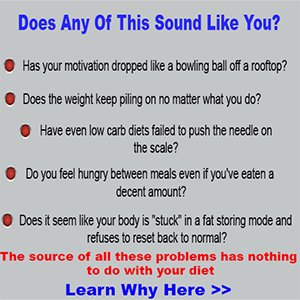The 1 Popular Diet Strategy Making You FAT?
Want another reason to avoid the dreaded artificial sweeteners?
Then you need to check this out:
A new study shows, artificial sweeteners – yes, the same kind that is found in your diet soda, low-calorie chewing gum, and other foods – has been shown to throw off your gut population!
And, not for the better, I should add!
Give me a second to explain…
Artificial Sweeteners and Gut Bacteria
On any given day, there are millions of people on a diet.
And one of the easiest changes they make to their diet is to cut out high-calorie drinks and replace them with low- or non-calorie, artificially-sweetened foods or drinks.
In fact, this is one of the most common practices for people looking to boost their fat loss.
But, is it the best way to do it?
Well, some will say yes, while others will say no.
The reason: Research remains controversial, with some studies showing positive benefits, while others show negative benefits.
And unfortunately for you, it seems there is more negative research than there is positive!
For example, clinical studies show that artificial sweeteners – due to the fact they may be 10 times sweeter than sugar – lead to intense cravings for sugary junk food.
And other studies show that they could lead to fat gain, issues with blood sugar and insulin levels, and a much higher risk for full-blown diabetes development.
But that’s not all…
A brand-new study shows that artificial sweeteners may alter your gut bacteria – and not for the better!
As you may or may not know, your gut bacteria play a vital role in your health. From warding the nasty bacteria that could make you sick, to the digestion of food particles, your gut bacteria play a very important role in maintaining cellular homeostasis and optimal health.
Well, this new study shows that artificial sweeteners may mess with your gut bacterial population, therefore causing glucose intolerance.
And guess what? The researchers believe that “NAS (non-nutritive artificial sweeteners) altered microbial metabolic pathways are linked to hosts susceptibility to metabolic disease.”
Simply put, the change in the subjects' gut population – due to the use of artificial sweeteners – may increase their risk for metabolic disorders, such as metabolic syndrome, insulin resistance, and diabetes.
They concluded from their work: ‘Collectively, our results link NAS consumption, dysbiosis and metabolic abnormalities, thereby calling for a reassessment of massive NAS usage.”
Take Home Message
Artificial sweeteners are commonly used as a way to sweeten food without adding excess calories to their day.
However, they are often associated with unruly cravings and weight gain.
And now, according to the results of this new study, artificial sweeteners may also be linked to impaired glucose uptake by your cells.
This could lead to diabetes and other future health issues.
So for your health – and for better blood sugar control and fat loss – consider avoiding the use of artificial sweeteners!
Click HERE For The Simplest Way To Reclaim Your Health And Wellness >>
References:
Suez J, Korem T, Zeevi D, Zilberman-Schapira G, Thaiss CA, Maza O, Israeli D, Zimora N, Gilad S, Weinberger A, Kuperman Y, Harmelin A, Kolodkin-Gal I, Shapiro H, Halpern Z, Segal E, Elinav, E. Artificial sweeteners induce glucose intolerance by altering the gut microbiota. Nature. 2014.
About Jayson Hunter & Jaylab Pro

Jaylab Pro was founded by Registered Dietitian Jayson Hunter. Jayson has been recognized as one of America's foremost weight loss experts by America's Premier Experts™. He has also been featured in USA Today for this accomplishment. Jayson is also a best-selling author having co-authored multiple books in health & fitness and business growth. Jayson and the Jaylab Pro team are proud to create content that helps improve the lives of millions of people around the world. We hope you enjoy it just as much as others have.
 If you order a JayLabPro SmartShip product or any Combo Package, we will automatically ship you a new supply of the product or products you have ordered every month, starting 30 days after your initial order is shipped, and continuing until you cancel. The credit card you are using today will be billed the lowest available price for those product or products when your order is shipped, but shipping will be FREE. You may log into your customer account or call our customer service department toll-free at 1-888-9GETPRO (1-888-943-8776) between the hours of 8am – 9pm EST Mon-Fri to cancel future shipments, customize the timing of your shipments, or change the credit card used for billing.
If you order a JayLabPro SmartShip product or any Combo Package, we will automatically ship you a new supply of the product or products you have ordered every month, starting 30 days after your initial order is shipped, and continuing until you cancel. The credit card you are using today will be billed the lowest available price for those product or products when your order is shipped, but shipping will be FREE. You may log into your customer account or call our customer service department toll-free at 1-888-9GETPRO (1-888-943-8776) between the hours of 8am – 9pm EST Mon-Fri to cancel future shipments, customize the timing of your shipments, or change the credit card used for billing.










